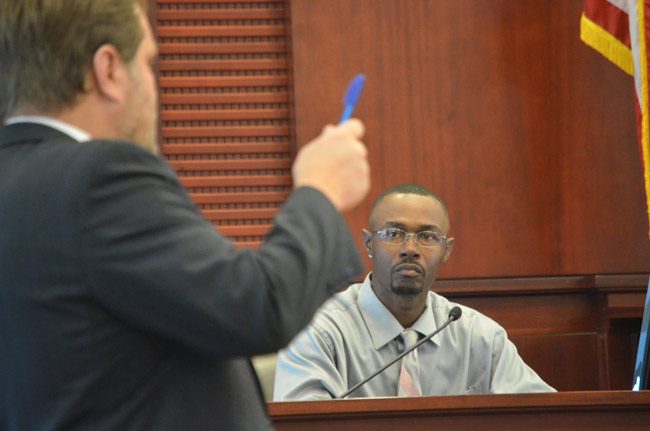
C.J. Nelson is a 40-year-old resident of Palm Coast’s P-Section, married, father of eight children, holding two jobs. And now battling to stay out of prison.
A year and a half ago he punched a 16-year-old girl in the face, knocking her to the ground outside Epic Theater in Palm Coast’s Town Center. The punch was caught on another girl’s cell phone. Nelson claimed self-defense, saying he feared the girl, whom he says looked like a boy under a hoodie, was threatening to cut him with a knife. The girl denies it. No knife was ever found.
Nelson was charged with child abuse, a third-degree felony. A first-time offender would typically not be sentenced to prison time. But Nelson isn’t a first-time offender. He’s been convicted on four drug-related felonies a decade ago. The prosecution offered him a deal, but it includes prison time, something Nelson wants to avoid—not just for his sake, but as its breadwinner, for his family’s sake.
This morning at the Flagler County courthouse, all the principals involved in the October 2016 altercation appeared together again for the first time as Josh Davis, Nelson’s lawyer, argued a rarely heard motion locally, and what may be the first of its kind in the absence of a weapon: a stand your ground defense.
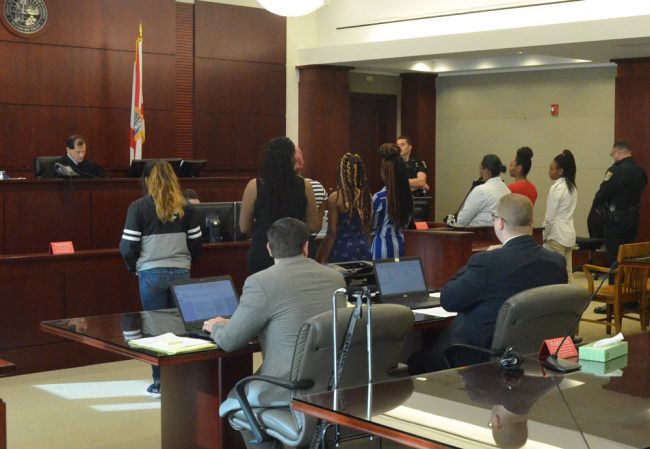
Stand Your Ground motions are not argued at trial but in pre-trial motions, which can themselves turn into a trial in all but name. This morning’s three-hour proceedings certainly did, drawing more witnesses to the stand—11—than several recent local murder and rape trials. If the motion was granted, the case would have been dismissed and ended then and there.
It was not. It was a debacle instead, at least for the defense.
Nelson lost, and now faces trial sometime later this spring. Judging from today’s proceedings, in which the case Davis built on behalf of Nelson collapsed in front of anyone watching in the courtroom—with a key witness contradicting claims she’d made in a deposition, though she wasn’t the only one with contradictions—Nelson faces a very high risk of conviction, now that the self-defense argument has been demolished.
It was not the way the day was supposed to go. But seldom does a defense’s witnesses prove so serially unhelpful to its cause. Assistant State Prosecutor Mark Lewis turned the stand-your-ground case into a legal clinic, showing again and again how to effectively decimate the credibility of witnesses by using their own words and contradictions against them.
In the end, Davis was almost forced to place Nelson himself on the stand. Nelson did not help his case, at times playing coy with the simplest questions he did not want to answer, but mostly coming across as aggressively defensive, questioning Lewis to the point that the prosecutor had to remind him repeatedly who was asking the questions. Fortunately for Nelson, there was no jury: the case was for Circuit Judge Dennis Craig to decide. And fortunately for Davis, the hearing played out as a rehearsal for trial, affording the attorneys on both sides an unusually detailed look not only at what the witnesses will say, but how.
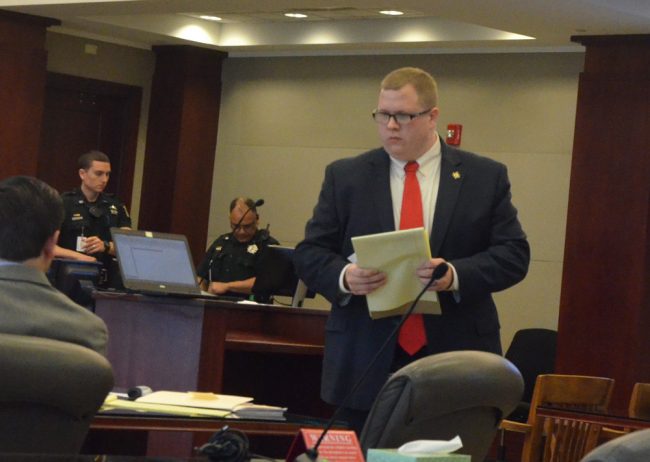
The video, a jagged, brief clip less than a minute long, was central to the prosecution’s argument that Nelson was the aggressor, and that claims that someone had a knife or a gun were baseless: no such shouting is heard during the video. S.K. does not even appear to have been wearing her hoodie, and when she falls, both her hands are on the ground, trying to brace her from falling. Her older sister, Trainet Kaufman, now 20, is seen in the video on her phone, then shouting at Nelson, who quickly walks away after slugging the girl, that he had just struck a disabled girl and will go to prison.
The incident originated at school earlier that day, where D.N., one of Nelson’s daughters had had a fight with S.K. That evening S.K. and two sisters went to see a movie at Epic. So did Nelson, his wife and his family, in numbers large enough to fill two cars. When Nelson’s family arrived, his daughter D.N. and others went up to the ticket booth to check on the movie price. That’s where the encounter with the Kaufman sisters began, quickly escalating into a loud and vulgar shouting match, but nothing physical—and really, nothing that unusual for a cinema plaza where talking smack is a milder echo of language reeled off inside on the silver screens every minute.
D.N. told the court Trainet Kaufman tried to fight her, “Like, how you fight with anybody, coming at you wrong.” But when Lewis asked her to be more specific, she couldn’t answer. “I don’t know how to explain it,” she said. But she never saw a knife.
Then other witnesses Davis called began undermining his case. He asked another of the girls who was at the theater as part of Nelson’s group if she remembered hearing anyone shout “knife!” at any point.
“Not that I remember,” she said. Yet the girl, according to Davis, had said as much in a statement to police. He showed her the statement. Then she seemed to remember. But it was not convincing. “I heard like she had like a weapon or whatever,” she mumbled, calling it “her impression” that someone had a knife.
“We’re not here for your impressions,” Lewis snapped. “We need to hear what you saw or what you heard.” He continued: “If you didn’t see the knife, why did you write it in the statement?” She’d written that she’d actually seen a knife. He reads the statement.
“So the statement as written is not true?” Lewis asks the witness.
“Yes,” the witness concedes.
He asked if she or anyone in nelson’s group called the cops that night. They did not. He asked if she or they stayed behind to speak to the cops. They did not. Nelson had walked away, saying he’d be home. Deputies obtained statements from him and others in subsequent days. The victim’s group stayed behind, called the cops and spoke to them that evening. That difference did not work well in Nelson’s favor.
Lewis replicated his approach with witness after witness, again and again showing the video, again and again asking the witness to show where she was (none of the witnesses were men or boys, aside from Nelson), where she walked toward, where Nelson was, every time undermining what the witness had claimed, and drawing a picture of Nelson as the aggressor rather than the other way around.
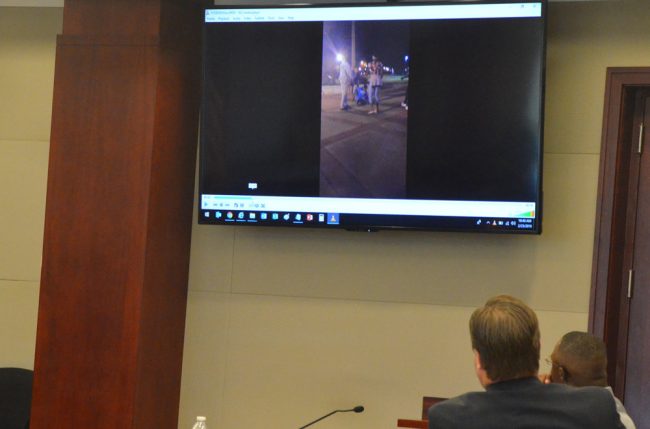
“So now you don’t remember whether there was a weapon mentioned or not,” Davis said, incredulous.
“Yeah,” the girl replied.
“Any idea what changed the memory?”
“I’m not sure.”
Lewis, of course, had no questions for the girl: she’d turned state’s witness.
It was halfway through the morning. Davis knew his case was falling apart. He didn’t hide it. As that witness walked away, he shook his head. He sat back, folded his hands together, took a sip of water, shook his head again, his body language rippling disbelief. He took a sip of water, put his face in his palms, then called his next witness. His questions after that were mostly pro-forma, his redirects almost absent.
Two hours in, he placed Nelson on the stand. Lewis caught him in inconsistencies: he’d told one cop that the girl had “pulled out a knife.” He’d told another that she’d had it under her shirt. He would not say if he’d ever heard anyone shouting anything about a knife. “I got my eyes focused on what’s happening in front of me,” he said. “Said she was going to cut me.” His claim that he was walking away from trouble did not stand up to Lewis’s scrutiny.
“She approached me, threatened me, said what she was going to do to me,” Nelson said. “She should have stayed in a child’s place.”
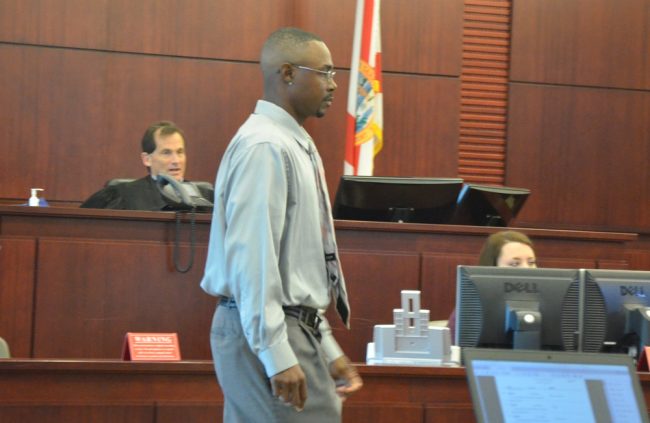
“No, my testimony is if you pretend to be somebody that you’re not, what can you do then?”
“You could walk away, you’re 39.”
“So I’m going to turn my back and walk?” Nelson said.
“You could have.”
“Yeah, and what if I got stabbed in the back?”
One of his family member is seen pulling him back from the scene after he hit the girl.
In his closing arguments, Lewis said there was “zero credible evidence to suggest there was a knife,” though it’s also true that whether there was a knife or not, in such cases the mere perception that there was a knife is enough to generate the sort of fears that then trigger self-defense. That leaves the credibility of witnesses’ beliefs and perceptions.
“At best all those witnesses contradict each other wildly,” Lewis said. “At lest two of them admit to being liars by writing untrue statements that are sworn to the police.”
Judge Craig didn’t take long to rule.
“Several of the witnesses have made inconsistent statements,” he said. “A good portion of the testimony was inconsistent with other testimony in the case and also inconsistent with other evidence in the case. Also, that Mr. Nelson has been convicted of four felonies, so in relation to credibility of witnesses and the evidence, the court is considering all of those factors.” The only objective evidence is the video, he said. Based on that evidence and the totality of the circumstances, “the state presented sufficient evidence that was clear and convincing that self-defense was not used and therefore the immunity in the statute”—that is, stand your ground—“would not apply.”
Davis’s motion was denied, and discussion moved to scheduling trial.





























Born and Raised Here says
Mr. Nelson has been convicted of four felonies and I would not take any of his actions or creditbility as a help to his defense. So sad that his children have to see the real person he is. Mr. Nelson needs help.
Marty Barrett says
Clearly an unprepared and/or an inexperienced defense lawyer in this case. Bringing such a motion under these facts was a tremendous stretch, let alone obviously not preparing for what YOUR OWN witnesses were going to say. Borderline malpractice? Or perhaps it is a ploy to engender sympathy for his client? (i.e. ‘this poor defendant, his lawyer is so terrible we can’t hold it against him’). So it could be diabolically clever. Nah, never mind…
anonymous says
I wonder if his ‘drug-related felonies’ were for marijuana?